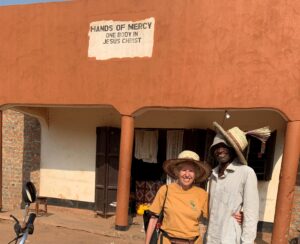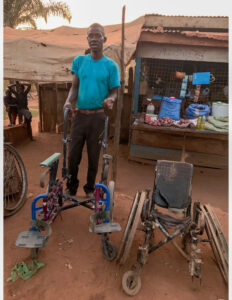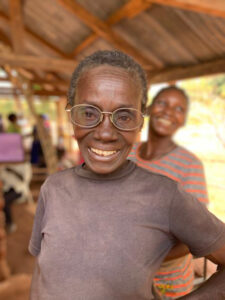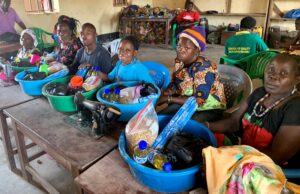The Eastern African country of South Sudan could be described as a huge sea of poverty, war, and lack of education. The lack of electricity or running clean water and the constant dirt and dust, as well as the limited variety of food grown, might discourage the visitor; but when you dig a bit beneath the surface, you find a people who love and trust the Lord beyond a question.

It is into this landlocked country that Hands of Mercy (HOM), a Recognized Service Organization of the LCMS, brings the love of Jesus. HOM began as the internship project of Deaconess Patricia Nuffer in a partnership with the Evangelical Lutheran Church in South Sudan (ELCS) to reach people with disabilities through two goals: bringing the tangible love of Jesus Christ and marketable skills training (such as raising chickens for eggs, tailoring, making local crafts, baking bread, taking and selling photographs).

Pat Nuffer travels to South Sudan once a year, bringing items like wheelchairs, pillowcase dresses, eyeglasses, sanitary pads and diapers sewn by volunteers, first aid kits, home health kits, prison kits, and more: “Often on the back of a motorcycle to get out in the bush, or in a nearby middle school classroom, or a walk to a familiar compound of friends, I get to be the bearer of your work and witness the impact ‘distribution days’ has.”
Nuffer continues: “Can the women in Indiana, or Michigan, or Texas, or a retired male engineer in Traverse City who collectively sewed hundreds of ‘girls’ pads’ understand the need of a young girl, embarrassed and fearful, who drops out of school because she got her first menstrual period in South Sudan? And the answer must be a ‘yes.’ Because each gave up time and money to make and send those pads to girls and women they will never know. And why? Because as Christians we believe all people bear the sacred image of God; as fellow ‘imago Dei,’ when they hurt, we hurt. So ‘distribution days’ is an integral part of why Hands of Mercy exists and provides the deep abiding satisfaction so many people receive from mission work. And now people with disabilities are at work assembling kits, to show they, too, have a heart for others in need—becoming themselves ‘givers,’ not just ‘takers’ in this life.”

According to Nuffer, a wheelchair is a “ticket out of the dirt” for those who have mobility issues. People who are born with cerebral palsy or even children who are born healthy but then are impaired by malaria are usually relegated to living on the ground. She says, “What does a wheelchair mean in South Sudan? Yes, it can mean mobility, being off the ever-present red dirt in the dry season, or mud in the rainy half of the year. Yes, it can mean hope for an opportunity to be a valuable part of a community or school. But most of all, I think it means people care. And for us, here in America, it is easy to care—our used wheelchairs or eyeglasses, or even a toy, get a second life that puts skin on the word ‘care.’”

Hands of Mercy owns a couple of buildings which house a classroom, a shop, storeroom, office, photo studio, and an Adult Learning/Deaconess Training Center. On Fridays, people with disabilities come to the center to get soap, and they get to make things with donated beads to take home and sell for their own personal income. Nuffer adds: “Once every few months we [also] have ‘capital’ day. This was inaugurated last trip to help share in the income HOM receives from its rental buildings. We buy and give each person a basin with beans, rice, sugar, a plastic cup, plastic bags, water bottles filled with cooking oil, and several long bars of soap—all for each to set up his/her own little selling business.” All the work of the students is sold in the shop, where basic math and bookkeeping skills are learned.
The center also offers solar recharging, processing ground nuts, quilts for widows, first aid and hygiene kits, and literacy instruction.
To learn more about HOM and see donation wish lists, visit handsofmercymission.org. To have Pat Nuffer come speak about HOM to your congregation or gathering, contact her by email here.
Photos courtesy of Pat Nuffer
